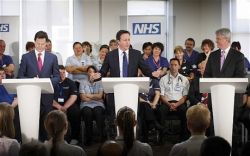 Broken Arrow – so-called because he doesn’t work, and can’t be fired – stood up red-faced in the Commons on Monday. A nervous tie-fingering moment later, he launched into a resentful defensive downcast drone about his beloved Titanic Bill. It was already more than four fifths of the way across the Atlantic, he declared – it had concluded its committee stage, and eighty-seven percent of GPs covering forty-five million patients had already signed up to join the party. Labour jeered and heckled, and Broken Arrow’s face got redder. But a spectre of icebergs had loomed, and through gritted teeth, he admitted the most unTitanic of conduct: a slow down. The government, he said, would take advantage of a ‘natural break’ in the passage of the Bill to ‘pause, to listen, and to engage’. Labour, of course weren’t having any of it. Broken Arrow hadn’t listened before, so why should he start listening now?
Broken Arrow – so-called because he doesn’t work, and can’t be fired – stood up red-faced in the Commons on Monday. A nervous tie-fingering moment later, he launched into a resentful defensive downcast drone about his beloved Titanic Bill. It was already more than four fifths of the way across the Atlantic, he declared – it had concluded its committee stage, and eighty-seven percent of GPs covering forty-five million patients had already signed up to join the party. Labour jeered and heckled, and Broken Arrow’s face got redder. But a spectre of icebergs had loomed, and through gritted teeth, he admitted the most unTitanic of conduct: a slow down. The government, he said, would take advantage of a ‘natural break’ in the passage of the Bill to ‘pause, to listen, and to engage’. Labour, of course weren’t having any of it. Broken Arrow hadn’t listened before, so why should he start listening now?
Two days later, Broken Arrow was joined by Dark Cloud and Shining Helmet in a show of tribal unity. Lined up like contestants in TV quiz at a hospital ‘somewhere in Surrey’, which turned out be Frimley Park, they spun a curious curl of mixed messages, which appeared to be (a) we love the NHS (b) no change is not an option, but (c) hey! – that’s OK! – we’re here to listen! The massed hospital staff remained paused, perhaps even listening, but definitely not engaged.
Meanwhile, pro-commissioning ex-Royal College of General Practitioners chair, Professor Steve Field, has been called in to head up the bizarrely named ‘Future Forum’ panel, which will oversee the government’s ‘listening exercise’. Rumour has it that the panel will send a questionnaire about the reforms to NHS staff – a promising faux-consultation wheeze if the paltry nine percent response rate to the BMA’s recent survey of doctors over the reforms is anything to go by. Not that any survey or consultation exercise is likely to change anything – asking Field to lead the review has all the makings of having bin Laden chair a forum on what to do about the infidels.
Further evidence were it needed that the ‘listening exercise’ is more about us listening to the government’s case for NHS reform than the government listening to us came from a leaked memo from NHS chief executive David Nicholson which declared large – and central – chunks of the Bill, including the abolition of PCTs, and the handing over of commissioning budgets to GP consortia, to be inviolate.
Dr No does not enjoy being cynical, but with the cards stacked as they are – the Bill already far advanced, most GPs already enrolled in consortia, a stacked review panel, and much of the Bill declared inviolate – he finds it very difficult not to conclude that the ‘listening exercise’ will go the way of the ‘listening bank’ – into obscurity.
